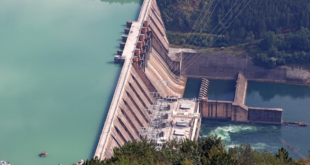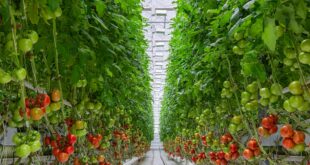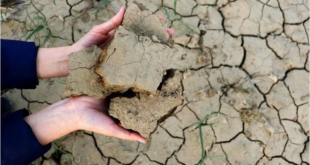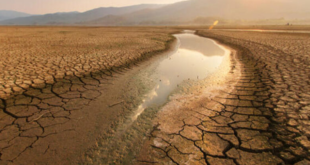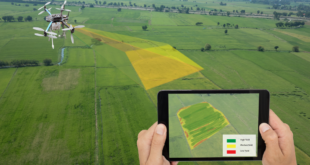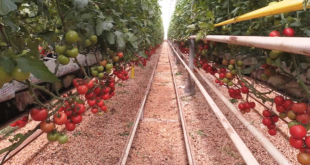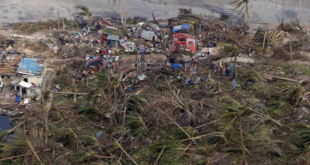Climate change has decreased hydroelectric energy generation in the Upper Euphrates Basin, says the new HPA Report... The report titled “The Impact of Climate Change in the Upper Tigris and Euphrates Basin,” prepared by the Hydropolitics Association, says that “the electricity generation of Keban, Karakaya, and Atatürk Dams has gradually …
Read More »GEOTHERMAL, THE EMPLOYMENT SOURCE OF ENERGY SECTOR…
Press release… Ali Kındap, Chairman of the Board of Directors of the Geothermal Energy Association (JED), said that the sector currently employs over 20 thousand people in areas such as energy production, thermal tourism, residential heating and geothermal greenhouses. “IT CAN MULTIPLY ITS EMPLOYMENT BY FIVE TIMES” Stating that geothermal …
Read More »DROUGHT THREATENS TURKIYE’S AGRICULTURAL FUTURE!
ANKARA… The Agriculture and Forestry Ministry has issued a stark warning about the impending impact of drought on Türkiye’s agricultural sector, specifically pointing to a significant decrease in the production of vital crops and its adverse effects on animal husbandry. The ministry, which highlights the potentially devastating consequences until 2050, …
Read More »ALI KINDAP: TURKIYE COULD BE A LEADING FOOD EXPORTER BY USING GEOTHERMAL ENERGY
Press release… TOMATOES IN PAIN, BANANAS IN VAN, STRAWBERRIES IN ERZURUM NOT IMPOSSIBLE… GEOTHERMAL GREENHOUSES ARE THE KEY TO BOOST PRODUCTION IN AGRICULTURE… GEOTHERMAL ENERGY ASSOCIATION (JED) CHAIRMAN OF THE BOARD OF DIRECTORS ALİ KINDAP:“BY INCREASING OUR AGRICULTURAL PRODUCTION WITH GEOTHERMAL GREENHOUSES, WE CAN REDUCE FOOD PRICES AND BECOME ONE …
Read More »DR. SULEYMAN SOYLU: SEED SOWING IS POSTPONED DUE TO LACK OF RAIN
Prolonged drought is having an increasingly negative impact on agricultural production in Türkiye, with dry days increasing and the soil becoming increasingly dry. Dr. Süleyman Soylu Nowadays, when the amount of water in the dams is approaching dangerous levels, the situation is different for the month of October, when the seeds meet the soil, …
Read More »ABANDONED AGRICULTURAL LANDS COULD BE A SOLUTION TO FOOD INSECURITY!
A new study shows that reusing abandoned agricultural lands could be a useful strategy to tackle food insecurity and climate change. In many parts of the world, while new agricultural land is constantly being brought into use, too much agricultural land is being abandoned. Between 1992 and 2020, it is …
Read More »DROUGHT IN THRACE REGION; WHEAT TO BE SOWN ON DRY LAND!
Producers in Thrace, one of the important grain production centres of Türkiye, will sow wheat seeds on dry land this year as they did last year due to drought. Hüseyin Arabacı Thrace farmers, who entered the sowing period in wheat, could not carry out the pre-sowing tillage work as required …
Read More »PRECISION AGRICULTURE IS SHAPING THE FUTURE OF FARMING…
The United Nations (UN) has highlighted the decline in “soil biodiversity and productivity.” As we face the challenges of dwindling resources and the threat of food scarcity, one might be tempted to feel overwhelmed. Yet, amidst these challenges lies the solution, emerging from an unexpected place: the digital revolution. Corporate …
Read More »ALI KINDAP: WE CAN REDUCE FOOD PRICES BY INCREASING AGRICULTURAL PRODUCTION WITH GEOTHERMAL GREENHOUSES
With the rapidly increasing utilization in agriculture around the world, geothermal energy stands as a key driver for diversifying the products and spreading them to all regions regardless of their climate in Türkiye, which holds leadership in Europe in terms of geothermal resources. Geothermal energy, which has more than 1,500 natural outlets …
Read More »FAO; DISASTERS CAUSE 3.8 TRILLION DOLLARS IN CROP LOSSES OVER 30 YEARS!
Natural and man-made disasters have caused 3.8 trillion dollars in crop and livestock losses over 30 years, the UN‘s Food and Agricultural Organization said on Oct. 13. Floods, droughts, insect infestations, storms, disease and war have caused about 123 billion dollars per year in lost food production between 1991 and 2021, the equivalent …
Read More » THE GLOBAL WINDOW OF TURKISH FOOD AND AGRICULTURE The Global Window of Turkish Food and Agriculture Sector
THE GLOBAL WINDOW OF TURKISH FOOD AND AGRICULTURE The Global Window of Turkish Food and Agriculture Sector


